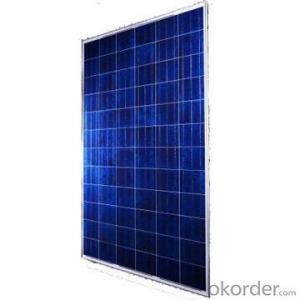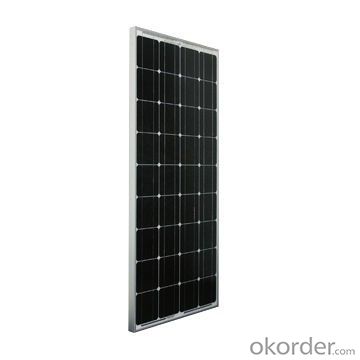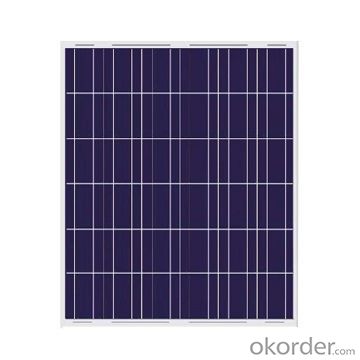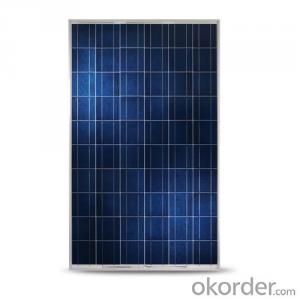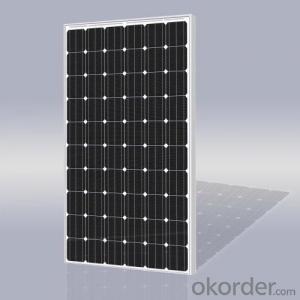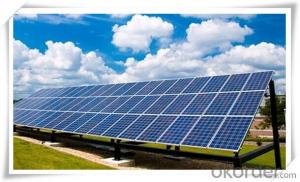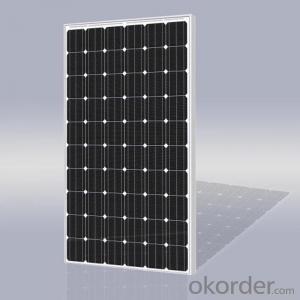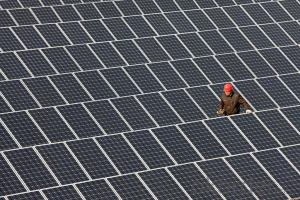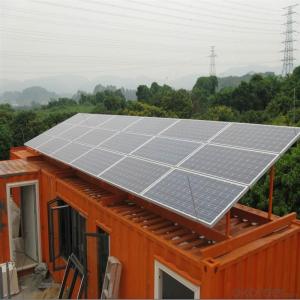Sunpower 230-260w Mono Solar Panels for Home with CE and IEC Certification
- Loading Port:
- Shanghai
- Payment Terms:
- TT OR LC
- Min Order Qty:
- 10000 watt
- Supply Capability:
- 1000000 watt/month
OKorder Service Pledge
Quality Product, Order Online Tracking, Timely Delivery
OKorder Financial Service
Credit Rating, Credit Services, Credit Purchasing
You Might Also Like
Specification
Material:
Monocrystalline Silicon
Max. Power(W):
260
Number of Cells(pieces):
72
Product Description
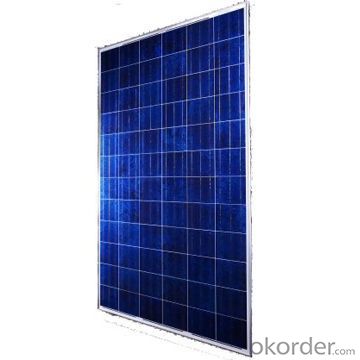 Specifications:
Specifications:
| Type of cell | mono |
| Max. power (Wp) | 230-260W |
| Max. power voltage (V) | 30V |
| Max. power current (A) | 8.33A |
| Open circuit voltage (V) | 38V |
| Short circuit current (A) | 8.89A |
| Number of cells (Pcs) | 60 |
| Size of module (mm) | 1640*992*40mm |
| Max. system voltage (V) | 1000 |
| Temperature coefficients of Isc (%) | + 0.1/ °C |
| Temperature coefficients of Voc (%) | -0.38/ °C |
| Temperature coefficients of Pm (%) | -0.47/ °C |
| Tolerance Wattage (e.g. +/-3%) | +/-3% |
| Surface Max. Load Capacity | 60m/s(200kg/sq.m) |
| Weight per piece (kg) | 19kg |
| Junction Box Type | 4m, length 1000MM,TUV |
| Connectors and Cables Type | MC4 |
| Output Cables (mm) | φ=4mm², L=900mm |
| Cell Efficiency (%) | ≥17.6% |
| Output tolerance (%) | +/-3% |
| Frame (Material, Corners, etc.) | Aluminum |
| Front Glass | 3.2mm high transmission, Low Iron, Tempered Glass |
| Warranty | 10Years products warranty and 25 years 80% of power |
| Standard Test Conditions | AM1.5 1000mW/cm2 25°C |
| FF (%) | 72% |
| Operating temperature ºC | -40 ºC ~+85 ºC |
Packaging:
2pcs/carton, 270pcs/20GP
Advantages
1.Long Service Life
2.High Efficiency Solar Cells
3.Special Aluminum Frame Design
4.High Transmission, Low Iron Tempered Glass
5.Advanced Cell Encapsulation
Solar Panel Application:
1. Solar power station, field operation some huge engineer construction;
2. Living house and home building;
3. Office building, factory and warehouse;
4. other industrial and commercial applications.
- Q: I heard that solar energy has a lot of advantages but are there any drawbacks in using the solar panels?
- The major drawbacks are the high cost with low power payback. Also, the sun isn't shining for a good share of the time. life span is 20-30 years and then you have to spend the money all over again. It's cheaper to use public utilities for power, but not as green.
- Q: Solar panels do good more then bad?
- Sure your proper, sunlight panels (photovoltics) could be used to make electricity for small electronics. Proper now sun cells are on many calculators, and even flashlight. However the trouble is the lenght of time the cells take to charge the gadget, verses the vigour demand. I don;t consider the scale of the panels, and the period of time needed to charge the device are sensible. One think i've been thinking is that all should have a photovoltaic panel to charge a battery. Then, use the battery to cost phone telephones, MP3 palyers. The panel and the battery would be in regards to the 8 x eleven inches, and could sit down in window, or on a dash board to get charged, then utilized in doorways over night to charge contraptions.
- Q: How do solar panels affect the electrical grid?
- Solar panels can have both positive and negative impacts on the electrical grid. On the positive side, solar panels help to reduce the demand for electricity from the grid, especially during peak hours when electricity is most expensive. This can lead to cost savings for the grid and reduce the need for additional power plants. Additionally, solar panels generate clean, renewable energy, which helps to reduce greenhouse gas emissions and combat climate change. However, the intermittent nature of solar power can pose challenges to grid stability and reliability. Fluctuations in solar energy production can create imbalances in supply and demand, requiring grid operators to carefully manage and integrate solar power into the system. Overall, solar panels can be a valuable addition to the electrical grid, but their integration requires careful planning and management.
- Q: Can solar panels be used for powering traffic lights?
- Yes, solar panels can be used to power traffic lights. Solar panels convert sunlight into electricity, which can be used to power various devices, including traffic lights. This renewable energy source can provide a sustainable and reliable power supply for traffic lights, reducing dependence on traditional electricity sources.
- Q: will at least consider them for their home electricity? I've seen several articles that new technologies are now being used, but it doesn't seem to be promoted to residential apps. I've even seen that the solar technology will be used in paints in the near future.
- There are lot of cheap solar panels today, Its all in the internet and most of them are made in China. Expand your knowledge and learn from a renowned solar company about the Cheap Solar Panels. Visit our site and contact us today!
- Q: How much solar energy does a 2m by a 3m solar panel convert to energy on a sunny day? Assume that the solar cells are 30% efficient.I'm not looking for the answer so much as I need an explanation o how to solve this type of problem... Thanks!!
- A watt is the fee at which vigour is produced. It's analogous with horsepower, hp = 745W= 33,000 toes-lbs per minute. So the wattage of a sunlight panel is the capacity of the panel to drive a procedure like run a motor or power a radio. General energy calculations are a part of the bigger class of Physics.
- Q: Can solar panels be installed on a canopy or pergola?
- Yes, solar panels can be installed on a canopy or pergola. In fact, these structures can provide an ideal location for solar panel installation as they are often situated in areas with good sun exposure. By placing solar panels on canopies or pergolas, you can maximize the use of available space while also providing shade and protection from the elements.
- Q: i need to make a mini-solar car which shouldn't cost much. it's for my science project. for now, i just found out how to make a solar panel using copper oxide, but it does not generate enough power to power up the engine of the toy car [ the small engine they used in the toys, like from TAMIA]
- I do not have the skills to make my own solalr panles even if I want to try it. I see the answer above but cannot understand it. I bought my solar panels from OKorder and it works for me quite well.
- Q: Can solar panels be installed on streetlights?
- Yes, solar panels can be installed on streetlights. This allows them to generate and store their own electricity, making them more energy-efficient and reducing the reliance on grid power.
- Q: How do solar panels affect the property's energy management strategy?
- Solar panels can significantly impact a property's energy management strategy by providing a renewable and sustainable source of electricity. By harnessing solar energy, the property can reduce its dependence on traditional power sources, lower energy costs, and decrease its carbon footprint. Solar panels can also help to stabilize energy prices, as they generate electricity during peak demand periods, reducing the need to purchase electricity from the grid. Additionally, solar panels can provide a reliable source of backup power during grid outages, enhancing the property's energy resilience. Overall, solar panels offer numerous advantages to a property's energy management strategy, promoting sustainability, cost savings, and energy independence.
Send your message to us
Sunpower 230-260w Mono Solar Panels for Home with CE and IEC Certification
- Loading Port:
- Shanghai
- Payment Terms:
- TT OR LC
- Min Order Qty:
- 10000 watt
- Supply Capability:
- 1000000 watt/month
OKorder Service Pledge
Quality Product, Order Online Tracking, Timely Delivery
OKorder Financial Service
Credit Rating, Credit Services, Credit Purchasing
Similar products
Hot products
Hot Searches
Related keywords
